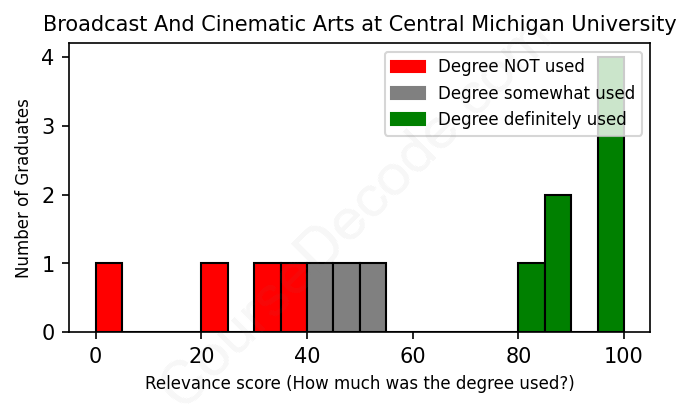
First, some facts. Of the Broadcast And Cinematic Arts graduates from Central Michigan University we've analyzed , here's how many have used (or NOT used) their degree in their career:

These are estimates based on AI analysis of 14 LinkedIn profiles (see below).
The verdict? Slightly below average. Overall, with an average relevance score of 63%, Broadcast And Cinematic Arts graduates from Central Michigan University have a slightly lower likelihood (-4%) of finding work in this field compared to the average graduate across all fields:
And for comparison, here's the chart for all profiles we've looked at across all degrees.
Also, after graduating, only 7% of these graduates have pursued further education other than another Bachelor's degree (such as a Masters degree or other), compared to the average across all profiles of 35%. This suggests a Bachelors degree is enough for most Broadcast And Cinematic Arts graduates, and it's normal to look for work straight after graduation.
See the details:
|
Relevance score: 100% We think this person has gone into a career highly relevant to their degree. We think this person has gone into a career highly relevant to their degree.
DEGREE INFOGraduated in 2019 from Central Michigan University with a Bachelor of Applied Arts in Broadcast And Cinematic Arts. No other secondary education since. JOB HISTORY SINCE GRADUATIONVideo Production Intern Houston Texans May 2019 - Jul 2020 Manager of Content Production  Washington Commanders Jul 2020 - Jun 2024 Senior Video Editor  LEARFIELD Apr 2024 - Present ABOUTFrom pre-planned shoots to live events, bringing stories and concepts to life is what I love to do. My experience in the studio, on the field and everywhere in between, leaves me confident I can meet your video needs. Finding innovative and creative ways to capture content is what drives me every day, let's talk and create something together. |
The top 10 most common jobs done by the graduates we've analyzed (ranked most common to least) are:
When looking at the job trends of graduates from the Broadcast and Cinematic Arts program at Central Michigan University, you can really see a split between roles that align closely with the degree and those that don’t. Many alumni gravitate towards positions like producers, video editors, and camera operators which definitely make the most out of what they learned in school. It’s clear that these roles not only rely on technical skills like video production and editing but also require a creative flair, all of which are central components of their education. Many of these jobs, such as those in production and audio supervision, translate well from the classroom to the real world. In fact, a good chunk of graduates ended up working in roles that directly tap into broadcast or cinematic arts skills, especially at well-known networks and studios.
However, there’s a noticeable portion of the job market that diverges from the core concepts of the degree. Some alumni found themselves in freelance roles or jobs that, while related to media, didn’t fully leverage the extensive training offered by the program. Positions like sales representatives or roles in unrelated fields (like accounting or culinary positions) leave viewers scratching their heads—how does that tie back to cinematic arts? In short, while a decent amount of CMU graduates enjoyed career success that directly reflects their studies, there’s still a good handful who ventured into areas that don’t quite align with their expertise in the audiovisual or broadcast realm. Overall, it seems like graduates tend to prosper in roles that connect directly back to their educational foundation, but there are definitely some paths that stray from the expected track.
Here is a visual representation of the most common words in job titles for Broadcast And Cinematic Arts graduates (this is across all Broadcast And Cinematic Arts graduates we've analyzed, not just those who went to Central Michigan University):

From the analysis of LinkedIn profiles of graduates with a degree in Broadcast and Cinematic Arts from Central Michigan University, it's clear that many of them have ventured into careers closely related to their field of study. Right after graduation, a lot of these alumni seem to find entry-level roles such as camera operators, production assistants, or audio engineers, primarily in television networks, local broadcasting stations, and production companies. For instance, graduates from as early as 2011 started off as audio engineers or field interviewers, which are solid starting positions within the industry. This initial phase seems to set a foundation for gaining valuable experience in various roles within the broadcast and film sector.
As time progresses, particularly around the five to ten-year mark after graduation, many of these graduates appear to advance up the career ladder. We see them taking on roles like producers, video editors, and even key positions such as audio supervisors and directors of photography. Notably, some have even landed positions with recognizable names like National Geographic, Netflix, and Paramount Pictures. However, while many have stayed true to the broadcasting and cinematic arts path, some graduates have deviated from this trajectory, opting for jobs in unrelated fields, such as sales or serving. Overall, a significant number of CMU alumni seem to find themselves in fruitful careers relevant to their major, showcasing that their education has paved the way for continued growth in the media industry.
Honestly, getting a Bachelor’s degree in Broadcast and Cinematic Arts can be a mixed bag—it's not typically one of the harder degrees out there, but it does require a good amount of creativity and dedication. You’ll be diving into practical projects like filming, editing, and working with audio, which can be super fun, but you also have to balance that with understanding the theory behind it all. Some students find the hands-on experience really engaging, while others might struggle a bit with the technical aspects. Overall, if you’re passionate about storytelling and visual media, it can feel more like an exciting journey than a brutal grind, so as long as you're ready to roll up your sleeves and get involved, you’ll probably find it manageable!
Most commonly, in the LinkedIn profiles we've looked at, it takes people 4 years to finish a Bachelor degree in Broadcast And Cinematic Arts.
Looking at the career paths of these Central Michigan University grads in Broadcast and Cinematic Arts, it seems like most of them have carved out some pretty decent gigs, especially in the film and media sectors. The folks who graduated in the earlier years, like those from 2011 to 2014, have had a mix of freelance and steady roles, with a few landing positions at big names like National Geographic and Netflix, which likely pays pretty well. The later graduates seem to be gaining traction too, with roles that include video editing and production for various sports and entertainment organizations. While the salaries can vary significantly depending on the role and location, there’s a good chance they’re doing better than average for entry-level jobs, especially considering the prestige of their employers. Overall, it looks like they've got a solid foundation to build upon, though, like any industry, it probably comes with its ups and downs!
Here is a visual representation of the most common words seen in the "about" section of LinkedIn profiles who have a Bachelor degree in Broadcast And Cinematic Arts (this is across all Broadcast And Cinematic Arts graduates we've analyzed, not just those who went to Central Michigan University). This may or may not be useful:

Here are all colleges offering a Bachelor degree in Broadcast And Cinematic Arts (ordered by the average relevance score of their Broadcast And Cinematic Arts graduates, best to worst) where we have analyzed at least 10 of their graduates:
| College | Score | Count |
|---|---|---|
 Central Michigan University Central Michigan University
|
63 | 14 |